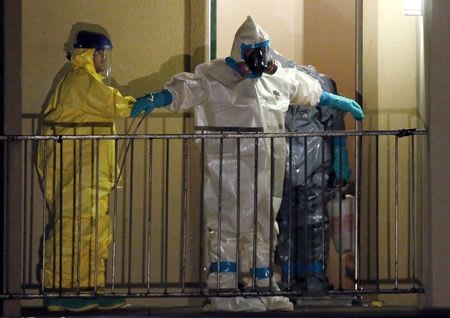
Reuters/Reuters - A worker in a hazardous material suit is sprayed down by a co-worker after coming out of an apartment unit where a man diagnosed with the Ebola virus was staying in Dallas
The first person to develop Ebola in the United States is struggling to survive at a Dallas hospital this Sunday after his condition worsened to critical, the director of the U.S. Centers for Disease Control said.
Thomas Eric Duncan became ill after arriving in the Texas city from Liberia two weeks ago - heightening concerns that the worst Ebola epidemic on record could spread from West Africa, where it began in March. It has killed more than 3,400 people.
"The man in Dallas, who is fighting for his life, is the only patient to develop Ebola in the United States," CDC Director Dr. Thomas Frieden said on CNN's "State of the Union."
In Dallas, a spokesman for Texas Health Presbyterian Hospital, Wendell Watson, said Duncan remains critical but would not elaborate.
In Nebraska, another hospital was preparing for the arrival of an Ebola patient who contracted the disease in Liberia, a spokesman said on Sunday. Nebraska Medical Center spokesman Taylor Wilson would only identify the patient as a male U.S. citizen expected to arrive on Monday. But the father of Ashoka Mukpo, a freelance cameraman, working for NBC, who contracted Ebola in Liberia, told Reuters on Friday that his son was going to Nebraska for treatment.
Duncan's case has highlighted problems that American public health officials are trying furiously to address: The Dallas hospital that admitted him initially did not recognize the deadly disease and sent him home, only for him to return two days later in an ambulance.
"The issue of the missed diagnosis initially is very concerning," Frieden said, adding that public health officials had redoubled their efforts to raise awareness of the disease.
"We're seeing more people calling us, considering the possibility of Ebola - that's what we want to see," he said on CNN. "We don't want people not to be diagnosed."
Frieden said he was confident the disease would not spread widely within the United States. U.S. officials are also scaling up their response in West Africa, where Ebola presents an enormous challenge, he added.
"But it's going to take time," Frieden said. "The virus is spreading so fast that it's hard to keep up."
The Nebraska hospital last month also treated and released, Dr. Rick Sacra, an American missionary who also contracted Ebola in Liberia. Sacra was admitted to a Massachusetts hospital on Saturday for a likely respiratory infection that is not believed to be a recurrence of the disease, hospital officials there said.
When asked on Sunday if the U.S. should suspend flights to and from affected countries or impose a visa ban on travelers from those countries, Anthony Fauci, director of the National Institute of Allergy and Infectious Diseases, said "absolutely not."
"When you start closing off countries like that, there is a real danger of making things worse," Fauci said on Fox News Sunday. "You can cause unrest in the country. It’s conceivable that governments could fall if you just isolate them completely."
The CDC has identified 10 people who had direct contact with Duncan as being at greatest risk of infection. Another 40 were being monitored as potential contacts, out of a group of 114 people initially evaluated for exposure risks, though none from either group has shown symptoms, Frieden said.
Ebola, which can cause fever, vomiting, lesions, diarrhea and hemmoraging, spreads through contact with bodily fluids such as blood or saliva. The fatality rate is high.
No comments:
Post a Comment
Through this ever open gate
None come too early
None too late
Thanks for dropping in ... the PICs